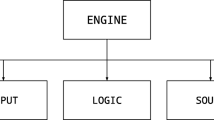Abstract
The game engines are one of the essential and daily used applications on game development. These applications are designed to assist in the creation of games’ contents. However, the games definition and specification is still complex. The mechanisms involved in the behaviour definition are not easy to standardise, given their dependency with the subjective game logic design and the selected programming language features. In this sense, this work presents the design and development of a game logic system for 2D video games. It draws from the study and analysis of the behaviour and game logic definition literature. From this, a game logic system has been developed from a first-order logic semantics and a reduced set of actions and conditions. The model has been tested with several games to determine its potential. Finally, one of these games is described with the proposed semantics, and further on it is also used as a reference for a user test against other game logic systems.
Access this chapter
Tax calculation will be finalised at checkout
Purchases are for personal use only
Similar content being viewed by others
References
Ampatzoglou, A., Stamelos, I.: Software engineering research for computer games: a systematic review. Inf. Soft Tech 52(9), 888–901 (2010)
Anderson, E.F., Engel, S., McLoughlin, L., Comninos, P.: The case for research in game engine architecture (2008)
Art, K.: Abstract platformer (2019)
Brachman, R., Levesque, H., Reiter, R.: Knowledge Representation. MIT (1992)
Brooke, J., et al.: SUS-A quick and dirty usability scale. In: Usability Evaluation in Industry, vol. 189, no. 194, pp. 4–7 (1996)
Daissaoui, A.: Applying the MDA approach for the automatic generation of an MVC2 web application. In: 2010 Fourth International Conference on Research Challenges in Information Science (RCIS), pp. 681–688. IEEE (2010)
Friedman, M.: The use of ranks to avoid the assumption of normality implicit in the analysis of variance. J. Amer. Stat. Assoc. 32(200), 675–701 (1937)
Games, E.: Unreal engine 4 (2019)
Geller, J.: Knowledge representation: Logical, philosophical, and computational foundations, brooks/cole, 2000, 512 pp. Mind. Mach. 13(3), 441–444 (2003)
Gregory, J.: Game Engine Architecture. AK Peters/CRC Press (2017)
Karplus, K.: Using if-then-else DAGs for multi-level logic minimization. University of California, Santa Cruz, Computer Research Laboratory (1988)
Millington, I.: AI for Games. CRC Press (2019)
Nystrom, R.: Game programming patterns. Genever Benning (2014)
Patel-Schneider, P.F.: A decidable first-order logic for knowledge representation. IJCAI 9, 455–458 (1985)
Unity Technologies: Unity 3D engine (2019)
Unity Technologies: Unity tower bridge defense tutorial (2019)
Wang, C., Joshi, S., Khardon, R.: First order decision diagrams for relational MDPs. J. Artif. Intell. Res. 31, 431–472 (2008)
Acknowledgments
This work has been supported by the Ministry of Science and Technology (TIN2016- 75866-C3-1-R, TI2018-098651-B-C54) and the Universitat Jaume I research projects (UJI-B2018-56, UJI-B2018-44).
Author information
Authors and Affiliations
Corresponding author
Editor information
Editors and Affiliations
Rights and permissions
Copyright information
© 2020 The Editor(s) (if applicable) and The Author(s), under exclusive license to Springer Nature Switzerland AG
About this paper
Cite this paper
Marín-Lora, C., Chover, M., Sotoca, J.M. (2020). A Game Logic Specification Proposal for 2D Video Games. In: Rocha, Á., Adeli, H., Reis, L., Costanzo, S., Orovic, I., Moreira, F. (eds) Trends and Innovations in Information Systems and Technologies. WorldCIST 2020. Advances in Intelligent Systems and Computing, vol 1159. Springer, Cham. https://doi.org/10.1007/978-3-030-45688-7_50
Download citation
DOI: https://doi.org/10.1007/978-3-030-45688-7_50
Published:
Publisher Name: Springer, Cham
Print ISBN: 978-3-030-45687-0
Online ISBN: 978-3-030-45688-7
eBook Packages: Intelligent Technologies and RoboticsIntelligent Technologies and Robotics (R0)




